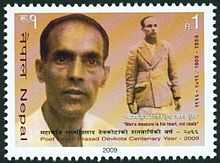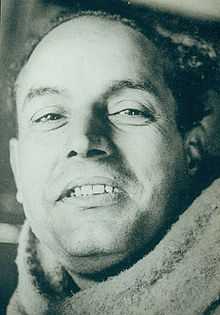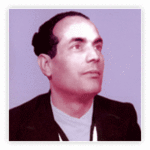Laxmi Prasad Devkota
| Laxmi Prasad Devkota लक्ष्मीप्रसाद देवकोटा | |
|---|---|
|
Mahakavi Laxmi Prasad Devkota | |
| Born |
12 November 1909 Kathmandu, Nepal |
| Died |
14 September 1959 Kathmandu, Nepal |
| Occupation | Poet and Scholar |
| Nationality |
|
Lakshmi Prasad Devkota (Nepali: लक्ष्मीप्रसाद देवकोटा; November 12, 1909 – September 14, 1959), was a Nepali poet. Devkota is revered by many as the greatest poet of Nepal, and has been given the title of "Maha Kavi" ("The Great Poet"). Devkota was born on the night of Lakshmi Pooja in 1966 BS to father Teel Madhav Devkota and mother Amar Rajyalakshmi Devi in Dillibazar, Kathmandu.[1][2][3]
Works
Devkota contributed to Nepali literature by bringing the Sanskrit tradition to its end and by starting a modern romantic movement in the country. Devkota was the first to begin writing epic poems in Nepali literature. Nepali poetry soared to new heights with Devkota's groundbreaking and innovative use of language. Departing from the Sanskrit tradition that dominated the Nepali literary scene, he wrote Muna Madan (1930), a long narrative poem in popular "jyaure" folk meter. The work received immediate recognition from the Ranas who ruled Nepal at that time. It tells the story of Madan who departs from his wife Muna to Tibet to make money. The poem deals with the themes of the hardships of journey away from home, the grief of separation, longing and death. The following couplet which is among the most famous and most frequently quoted lines from the poem celebrates the triumph of humanity and compassion over any artificial hierarchies created by caste and culture:
|
क्षेत्रीको छोरो यो पाउ छुन्छ, घिनले छुँदैन |
A Kshatriya touches your feet not with hatred but with love. |
Considered his magnum opus "Muna-Madan" has remained widely popular among the lay readers of Nepali literature.
Devkota had the ability to compose long epic poems with literary complexity and philosophical density in very short period of time. He wrote Shakuntala, his first epic poem and also the first "Mahakavya" (epic poem) written in the Nepali language, in a mere three months. Published in 1945, Shakuntala is a voluminous work in 24 cantos based on Kālidāsa's famous Sanskrit play Abhijñānaśākuntalam. Shakuntala demonstrates Devkota's mastery of Sanskrit meter and diction which he incorporated heavily while working primarily in Nepali.
Devkota also published several collections of short lyric poems set in various traditional and non-traditional forms and meters. Most of his poetry shows influence of English Romantic Poets like Wordsworth and Coleridge. The title poem in the collection "Bhikhari" ("Beggar") is a reminiscent of Wordsworth's "The Old Cumberland Beggar". In this poem, Devkota describes the beggar going about his ways in dire poverty and desolation deprived of human love and material comforts. On the other hand, the beggar is also seen as the source of compassion placed in the core of suffering and destitution. Devkota connects the beggar with the divine as the ultimate fount of kindness and empathy:
|
कालो बादलबाट खसेको |
Fallen from the black clouds |
Many of his poems focus on mundane elements of the human and the natural world. The titles of his poems like "Ban वन" ("Woods"), "Kisaan किसान" ("The Peasant"), "Baadal बादल" ("Clouds") show that he sought his poetic inspiration in the commonplace and proximal aspects of the world. What resonates throughout most of his poetry is his profound faith in humanity. For instance, in the poem "Woods," the speaker goes through a series of interrogations rejecting all forms of comfort and solace that could be offered solely to him as an individual. Instead he embraces his responsibility and concern for his fellow beings. The poem ends with the following quatrain that highlights his humanistic inclinations:
|
दोस्त कहाँ छन्? साथ छ को को? घर हो तिम्रो कुन देश? |
Where are your friends? Who go with you? Which land is your home? |
Besides poetry, Devkota also made significant contributions to the essay genre. He is considered the father of the modern Nepali essay. He defied the conventional form of essays by blatantly breaking the rules of grammar and syntax, and embracing a more fluid and colloquial style. His essays are generally satirical in tone and are characterized by their trenchant humor and ruthless criticism of the modernizing influences from the West in the Nepali society. An essay titled भलादमी (Bhaladmi) or "Dignitary" criticizes a decadent trend in Nepali society to respect people based on their outward appearances and outfit rather than their actual inner worth and personality. In another essay titled के नेपाल सानो छ? (Ke Nepal Sano Cha?) "Is Nepal insignificant (small)?", he expresses deeply nationalistic sentiments inveighing against the colonial forces from British India which, he felt, were encroaching all aspects of Nepali culture. His essays are published in the collection Laxmi Nibhandha Sanghraha (लक्ष्मी निबन्धसङ्ग्रह).
Gallery
-

Laxmi Prasad Devkota on Nepalese stamp
-
Laxmi Prasad Devkota on Nepalese stamp
-

Mahakavi Laxmi Prasad Devkota
Publications
Mahākāvya महाकाव्य (Epics)
- Shakuntal (शाकुन्तल)
- Sulochana (सुलोचना)
- Bana Kusum (बनकुसुम)
- Maharana Pratap (महाराणा प्रताप)
- Prithvi Raj Chauhan (पृथ्वीराज चौहान)
- Prometheus (प्रमीथस)
Poetry / Short Novels / Essays
- Bal Jasto (बल जस्तो )
- Bhikhari - Poetry Collection (भिखारी-कवितासंग्रह )
- Kunjini - Short Epic (कुञ्जिनि - खण्डकाव्य)
- Gaine Geet (गाइने गीत)
- Putali - Children's Poetry Collection (पुतली- बालकवितासंग्रह )
- Krishibala - Musical Play (कृषिवाला - गीतिनाटक)
- Dushyant-Shakantula Bhet - Short Epic (दुष्यन्त-शकुन्तला भेट खण्डकाव्य)
- Munamadan - Short Epic (मुनामदन - खण्डकाव्य)
- Raavan-Jatayu Youdha (रावण-जटायु युद्ध)
- Luni (लुनि)
- Sun Ko Bihan - Children's Poem (सुनको बिहान- बालकविता)
- Raj Kumar Prabhakar (राजकुमार प्रभाकर)
- Sita Haran (सीता हरण)
- Mahendu (म्हेन्दु)
- Dhumraketu
- Laxmi Nibandaha Sangraha - Essay Collection (लक्ष्मी निबन्धसङ्ग्रह)
Novels
References
- Poems Of Laxmi Prasad Devkota In Nepali (From Laxmi Kavita Sangraha) Compiled By Sanjaal Corps
- Laxmi Prasad Devkota: Nepal's Greatest Poet
External links
See also
|
